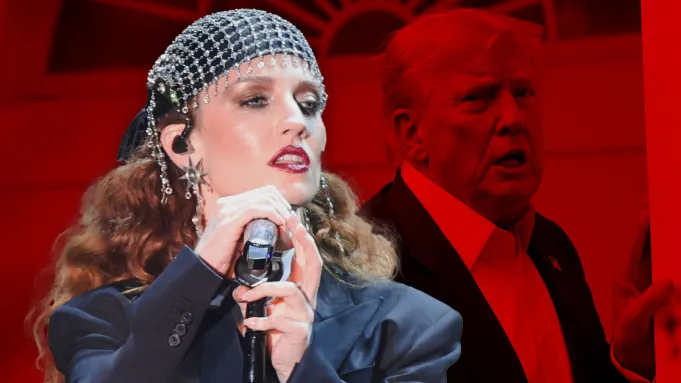Jet2 Deportation Video Sparks Outrage from Jess Glynne

The Jet2 deportation video has sparked outrage after British pop star Jess Glynne condemned the U.S. government’s use of her hit song Hold My Hand in a politically charged deportation clip. U.S. immigration officers escort handcuffed individuals onto a GlobalX plane in a video posted on X (formerly Twitter), set to the upbeat Jet2holiday advert soundtrack featuring Glynne’s 2015 hit.
How the Jet2 Deportation Video Became a Political Meme
The original Jet2holiday advert, now a global meme, pairs Glynne’s cheerful track with the tagline “Nothing beats a Jet2 holiday.” In recent months, the ad’s catchy tone and playful voiceover have featured in over two million videos online. Many users have used it to highlight chaotic or comedic travel mishaps. However, the White House’s recent use of the audio has changed the context dramatically. It has sparked backlash from the public and people linked to the campaign.

The controversial White House post included the caption: “When ICE books you a one-way Jet2 holiday to deportation. Nothing beats it!” This satirical attempt was widely condemned on social media. Users called it “inhumane,” “tone-deaf,” and “unprofessional.
Jess Glynne Condemns Jet2 Deportation Video for Misusing Her Music
Jess Glynne responded on Instagram, saying she wrote her music to “spread love, unity, and positivity — not division or hate.” She added that watching her song used in a context promoting deportation policies made her feel “sick.” The singer joins a growing list of artists publicly opposing the use of their work for political purposes without consent.
Voiceover Artist Also Speaks Out
Zoe Lister, the familiar voice behind the Jet2holiday commercials, also condemned the clip. “I would never condone using my voice to promote deportation or policies I fundamentally oppose,” she said. Lister said the ad was meant to bring humor and joy to people’s holiday stories—not to promote political agendas.
Political Memes From the Trump Administration
The White House has previously posted meme-style content, including an edited image of President Trump as Superman with the caption “Truth. Justice. The American Way. Superman Trump.” Another post earlier in July defended their meme-sharing activity by saying, “Nowhere in the Constitution does it say we can’t post banger memes.”

President Trump has pledged $170 billion towards border and immigration enforcement, including $45 million specifically for detention facilities. Immigration and Customs Enforcement (ICE) will reportedly receive $76.5 billion in funding over the next five years.
Jet2 Meme Goes Global — But Faces Boundaries
Despite the controversy, the Jet2 meme has exploded in popularity online. One of the most viewed clips shows a woman on a rollercoaster getting hit by a seagull. The Jet2 soundtrack adds comic relief. Creators on TikTok and Instagram have used the audio to highlight everything from airport disasters to ruined vacations.
Lister, who has worked with Jet2holidays for years, said the viral fame of the ad has taken her by surprise. “It’s hilarious that I’m now being booked for gigs and festivals just because of the voiceover. People can’t get enough of it.”
But she also issued a warning: “Politicians should not use this. It’s meant to be funny and lighthearted — not political.”
Not the First Artist to Object
Jess Glynne is not alone in confronting political use of music. ABBA had earlier objected to the use of their songs at political rallies. They requested the removal of all related videos. The estate of the late Sinéad O’Connor also condemned the use of her music, stating that she would have been “disgusted” by the association with such content.

Other major artists like Adele, Aerosmith’s Steven Tyler, and Pharrell Williams have all taken legal steps or issued public statements against the unauthorized use of their music in political campaigns.
Artistic Integrity vs. Political Messaging
The backlash over the White House deportation video featuring the Jet2holiday soundtrack underscores a deeper conflict between pop culture and political messaging. For Jess Glynne and Zoe Lister, the unexpected repurposing of a cheerful holiday ad into a tool for hardline immigration policy has raised important questions about consent, context, and the responsibility of those in power.




